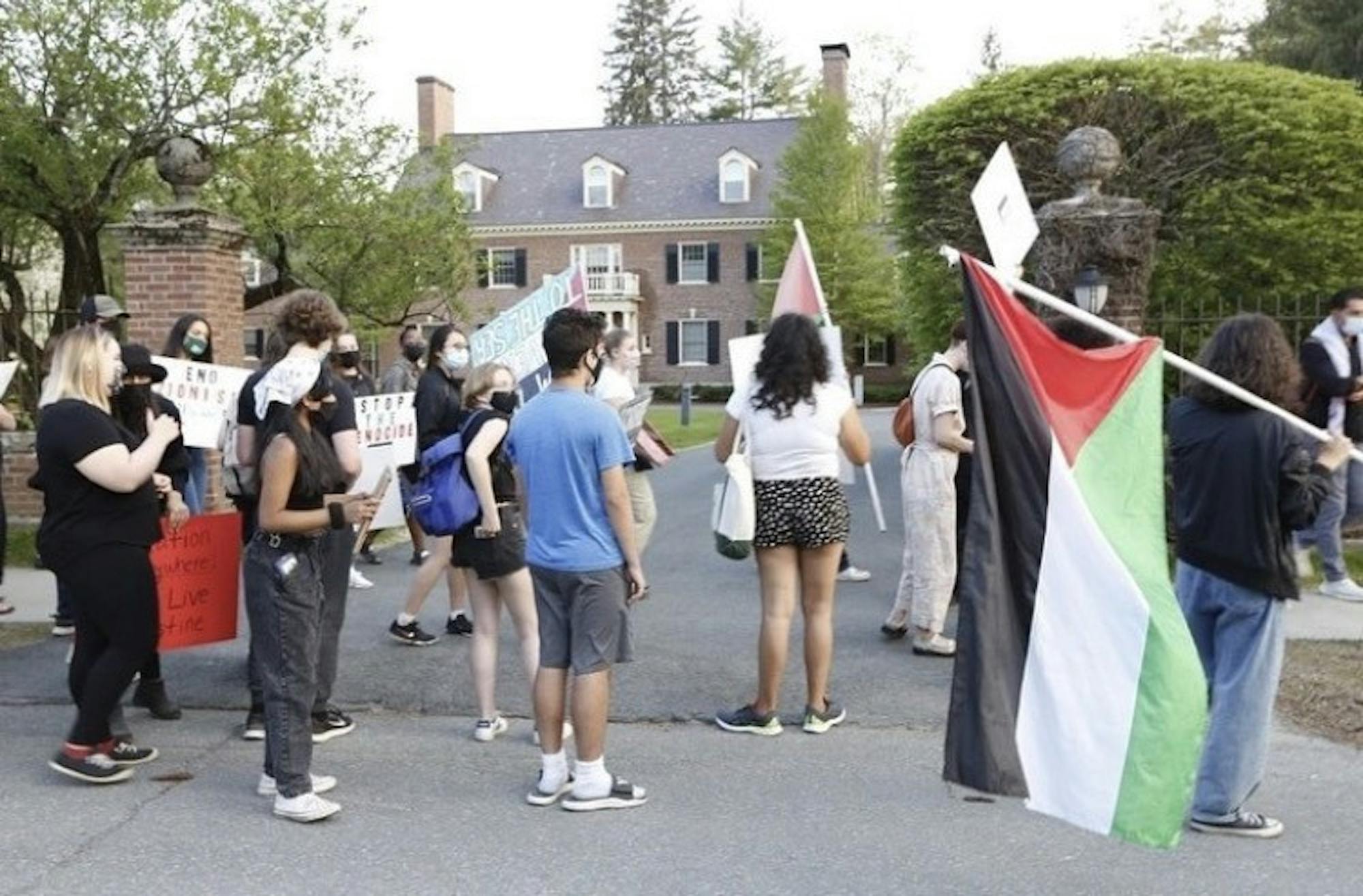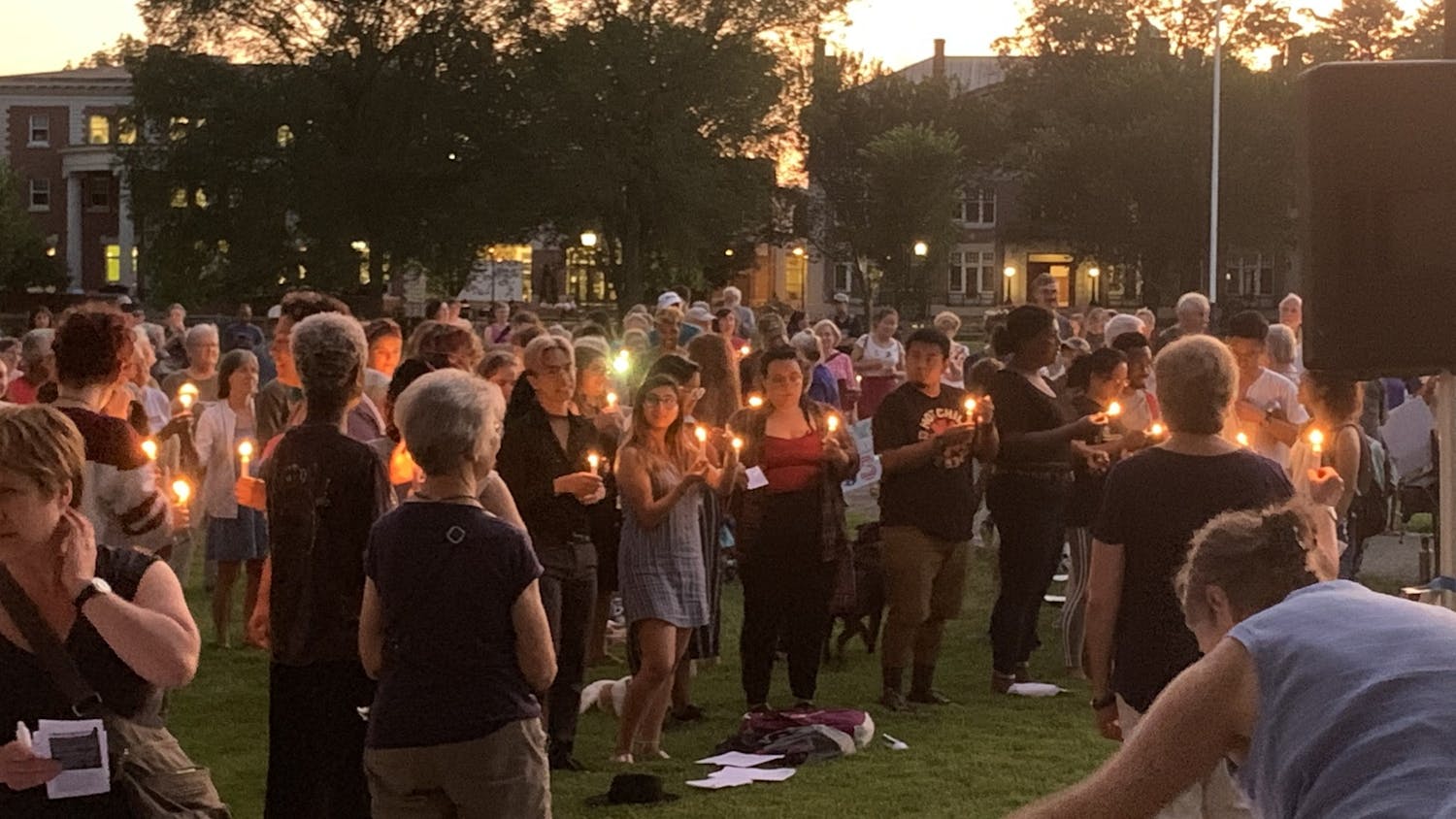A recent surge of violence in Israel, the Gaza Strip and the West Bank has garnered worldwide attention, compelling Dartmouth students and advocacy groups into action.
According to The New York Times, the 11-day conflict exploded on May 10, with Gaza militants firing rockets toward Jerusalem and Israel responding with air strikes. Although tensions predate recent history, the forcible evictions of six Palestinian families in the East Jerusalem neighborhood Sheikh Jarrah reinvigorated the long-simmering conflict in early May. From the perspective of many Palestinians, according to the Times’ May 7 article, the removal of the half-dozen families is symbolic of Israel’s extended effort to remove Palestinians from East Jerusalem. Israeli officials have dismissed the situation as a “real estate dispute.”
The Wall Street Journal and the Times reported that the evictions spurred protests throughout early May, culminating in a battle inside the al-Aqsa Mosque — the third-holiest site in Islam — on May 7. The parties differ on who sparked the conflict — the Israeli government claims that worshippers threw rocks at police officers, who then raided the mosque, while Palestinian witnesses say that the rock-throwing began only after the police entered and began firing stun grenades and rubber bullets. Around 200 Palestinians and 18 Israeli police officers were wounded during the clash.
In light of the violence, the Israeli Supreme Court postponed its scheduled May 10 ruling on whether to uphold the evictions. On May 10, Israeli air strikes on Gaza began after Hamas — the group that governs Gaza and that the United States has designated a terrorist organization — fired rockets at Jerusalem. In the subsequent week, as the Israel Defense Forces and Hamas traded air strikes and rocket attacks, civil unrest and mob violence on the ground erupted in Israel, Gaza and the West Bank.
On May 21, Israel and Hamas agreed to a ceasefire, Reuters reports, and the agreement has held thus far.
During the 11-day conflict, the highest death toll was in Gaza. According to reporting by The New York Times and Reuters, Israel’s airstrikes killed roughly 250 Palestinian civilians, including 66 children, and wounded more than 1,900. The strikes also destroyed 132 Gaza buildings and displaced 72,000 Palestinians, the United Nations reported. Outside of Gaza, Hamas’ and its allies’ rockets killed around 13 Israelis, including two children, in Israeli cities and towns, and Israeli forces killed 20 Palestinians in the West Bank.
In response, protests have taken place throughout the Upper Valley, including at the College. On May 15, the College’s Palestine Solidarity Coalition and Vermonters for Justice in Palestine, an advocacy group, protested on the Green and in Burlington, Vermont, respectively, to commemorate Nakba Day, a holiday observed by Palestinians worldwide. According to the VTJP press release, the Nakba — Arabic for “catastrophe” — was the “forcible expulsion” of more than 700,000 Palestinian Arabs from the former British Mandate following Israel’s declaration of statehood on May 14, 1948.
Wafic Faour, a Palestinian refugee and a member of VTJP, helped organize the protest in Burlington. Faour said the group has also organized petitions to congressional leaders and companies — including Vermont staple Ben and Jerry’s — asking them to withhold military aid and business, respectively, from Israel. He added that the group aims to integrate other social justice movements, such as Black Lives Matter, with the pro-Palestine cause.
“If we think about the Palestinians being displaced and replaced, it is the story of the Abenaki people here,” Faour said. “We are telling our story through the connection of our struggle and Black and brown people’s struggle."
Noah Daniel ’22, whose brother currently lives in Tel Aviv, Israel, said the losses on both sides have proven emotionally difficult for him and other Dartmouth students with family members affected by the conflict.
“It is just so, profoundly sad — this has been happening for generations, and there doesn’t seem to be any end to the cycle of violence,” Daniel said.
Daniel said that while he does not view the current Israeli government, led by Prime Minister Benjamin Netanyahu favorably, he does not believe Israel is unilaterally at fault for escalating tensions. According to Daniel, Hamas often hides its missiles in civilian areas — in 2014, he noted, Hamas missiles were found in a United Nations school in Gaza.
“Israel has missiles being shot at them, but Hamas also uses human shields,” he said. “They are in a bind — the mandate of any government is to protect citizens, but it clearly comes at the cost of killing others.”
President of Al-Nur — one of the campus groups that helped organize the May 15 pro-Palestine rally on the Green — Ameena Razzaque ’21 described the 11-day conflict as “really traumatizing.” Razzaque added that while she was heartened by the outpouring of support across the world, she feels that pro-Palestine voices are being “silenced on campus.”
“It’s never easy to see the kind of information that is coming out of this — the really horrific murders, the children that have died and the gruesome details of these deaths,” Razzaque said. “There are Palestinian students [at Dartmouth], and I can't even imagine how they feel being students on this campus where they can't exist freely.”
Razzaque added that while the ceasefire has brought relief, she remains concerned about Palestinians “[living] under occupation.”
“I don't want all of this support to dissipate; I hope that this momentum carries on, especially so that people can see a free Palestine,” Razzaque said. “Our end goal is to make sure that Palestinian people get basic human rights to live, to breathe, to have health care [and] to not have to raise their families and children under bomb shellings.”
Chabad president Benjamin Cape ’22, who previously served in the IDF, said that Hamas’ escalation of violence is “incredibly troubling and worrisome.”
“It is scary for us because there's nothing we can do to help our friends, and now I'm in the U.S., they're under fire, and there's not much I can do,” Cape said.
Cape also raised concerns about a rise in antisemitism following the conflict. According to reporting by National Public Radio, the U.S.-based Anti-Defamation League received 193 reports of antisemitic violence in the week following the outbreak of fighting in Israel, the Gaza Strip and the West Bank, a roughly 50% increase in reports from the week prior. Between May 7 and 14, the group found more than 17,000 tweets voicing support for Hitler.
“There has been an incredible increase over the last 10 days in antisemitic acts,” Cape said. “A lot of my friends are scared to speak out because of the backlash that they'll get.”
Cape said that while Palestinians’ standard of living in Gaza and the West Bank is “sub-ideal,” he feels the blame should not be placed “solely” on Israel. He added that he believes Israel has a right to exist and that Jewish people have a “right to self-determination in their ancestral homelands.”
“If all things went well, the solution would be to have a country like the United States where people have the freedom to practice their religion and to be around others who think differently,” Cape said.
On May 14, PSC released a statement demanding that the College condemn “the ongoing dispossession and ethnic cleansing in Palestine,” commit to the Boycott, Divestment, Sanctions movement, cancel any affiliations with or programs involving Israel and apologize for past statements in support of Israel.
A day later, the group held a campus-wide protest attended by roughly 170 community members, according to organizers. Protesters chanted slogans, including “From the river to the sea, Palestine will be free” — a phrase that has been labeled as antisemitic by some Jewish advocacy groups — and carried signs reading “We charge genocide,” “Free Palestine, boycott Israel” and “Free Palestine, liberation everywhere.”
Aileen Eagleton Gr ’23, a member of PSC, said she was involved in organizing the group’s protest. According to PSC’s Instagram page, protesters spoke out against Israeli “apartheid” and called on the College to boycott, divest from and sanction the Israeli state.
On May 18, the PSC also hosted a candlelight vigil on the Green to honor the Palestinians who died in the conflict. .
“I think it is important to show solidarity [with] the Palestinian people as they are facing occupation and oppression — I think it is our moral obligation to be speaking out on these issues,” Eagleton said.




